Block Bundle
Can Block Company Conquer the Fintech World?
Block, Inc., formerly Square, Inc., has undergone a significant transformation since its 2021 rebranding, evolving from a payment processing solution to a multifaceted financial technology powerhouse. This strategic shift underscores Block's ambitious vision to integrate diverse financial services, including its popular Cash App and pioneering blockchain initiatives. Understanding the Block SWOT Analysis is crucial to grasping the company's trajectory.
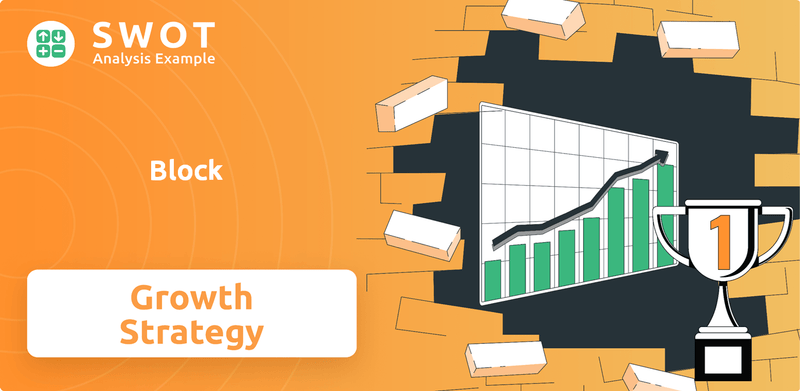
From its humble beginnings, Block Company's growth has been nothing short of remarkable, expanding its reach across various financial segments. This article delves into the intricacies of Block Company's strategy, exploring its innovative approaches to payment processing, its expansion into international markets, and its long-term growth potential within the dynamic fintech industry. We will also analyze the future prospects of Block Company stock, considering both the opportunities and the potential risks that lie ahead in this rapidly evolving market.
How Is Block Expanding Its Reach?
Block is aggressively pursuing several expansion initiatives to fuel its growth. These strategies focus on both geographical diversification and product innovation, aiming to broaden its market reach and enhance its service offerings. The company's approach involves strategic investments in existing platforms and the development of new technologies to stay competitive in the rapidly evolving fintech landscape.
A key component of Block's expansion strategy is the global growth of its Square ecosystem. This includes entering new international markets to tap into fresh customer bases and diversify revenue streams. Block also focuses on product development, particularly in its Cash App and TBD business units, to enhance its offerings and capture emerging opportunities in the fintech and blockchain sectors. These initiatives are vital for the company's long-term growth potential.
Strategic partnerships are also a crucial part of Block's expansion plans. Collaborations with various financial institutions and technology providers are designed to enhance product offerings and expand market reach. These partnerships allow Block to leverage external expertise and resources, accelerating its growth and innovation. This approach is essential for maintaining a competitive edge in the fintech industry and ensuring sustained success.
Block is actively expanding its global footprint, with a strong focus on entering new markets. For example, Square launched in Spain in early 2024, offering its integrated ecosystem to small and medium-sized businesses. This expansion is designed to increase its customer base and diversify revenue streams. The company's international growth strategy is a key driver of its overall Block Company Growth.
Block is heavily investing in product innovation, especially within its Cash App and TBD business units. The evolution of Cash App includes expanding its functionality beyond peer-to-peer payments. The TBD unit focuses on developing decentralized financial tools using blockchain technology, including efforts to facilitate Bitcoin adoption. This innovation is part of the company’s Block Company Strategy.
Partnerships play a vital role in Block's expansion strategy. Collaborations with financial institutions and technology providers enhance product offerings and market reach. These partnerships help Block leverage external expertise and resources, accelerating growth and innovation. This collaborative approach supports the company’s overall Block Company Future.
Block is significantly involved in Bitcoin-related initiatives, particularly through its TBD business unit. This includes the development of decentralized financial tools and protocols to facilitate Bitcoin adoption. The company's focus on Bitcoin is part of its broader strategy to innovate in the fintech and blockchain sectors. This focus is a key element of Block Company Analysis.
Block's expansion initiatives are designed to drive growth through geographical diversification, product innovation, and strategic partnerships. These efforts are crucial for enhancing its market position and capturing new opportunities in the fintech sector. The company's focus on these areas is expected to contribute to its long-term success.
- International Expansion: Launching Square in new markets, such as Spain in early 2024.
- Product Development: Enhancing Cash App with new features and developing decentralized financial tools through TBD.
- Strategic Partnerships: Collaborating with financial institutions and technology providers to expand product offerings and market reach.
- Bitcoin Integration: Developing tools and protocols to facilitate Bitcoin adoption and integration within its services.
Block SWOT Analysis
- Complete SWOT Breakdown
- Fully Customizable
- Editable in Excel & Word
- Professional Formatting
- Investor-Ready Format
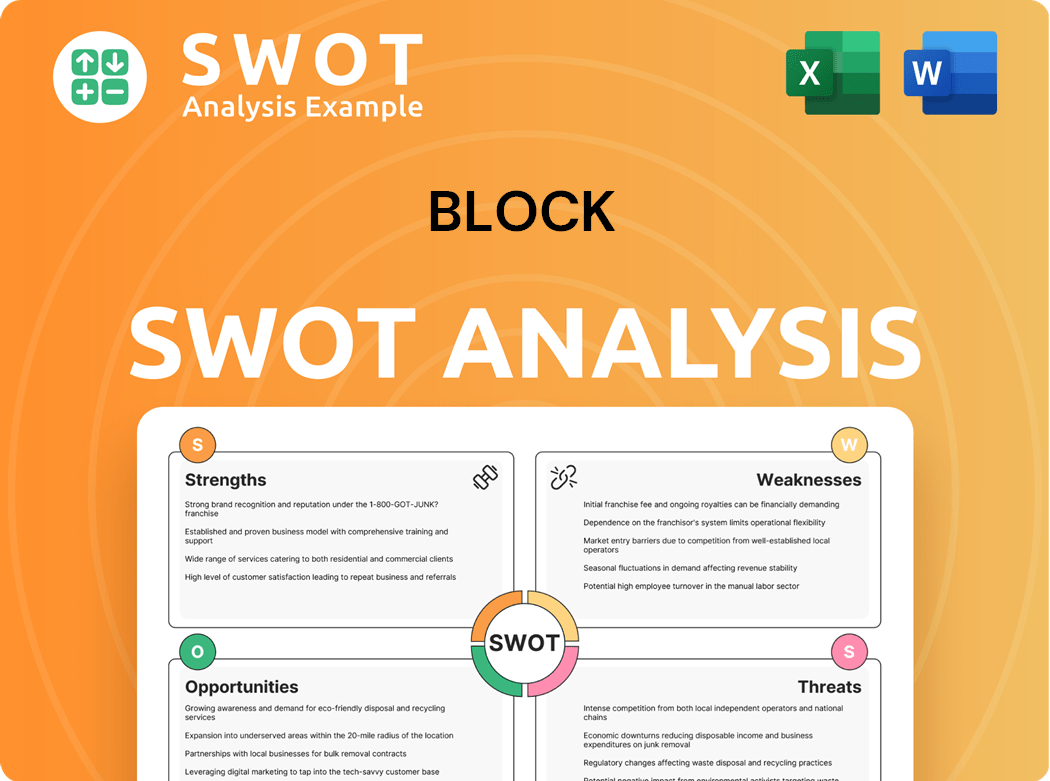
How Does Block Invest in Innovation?
The core of Block Company's strategy is built on technology and innovation, which are key drivers for its sustained growth. The company invests heavily in research and development (R&D) to stay ahead in the rapidly evolving fintech industry. This approach involves both internal development and strategic partnerships to push the boundaries of financial technology, ensuring it remains competitive in the market.
Block focuses on digital transformation across its Square and Cash App ecosystems. This commitment continually enhances user experience and operational efficiency through automation and advanced analytics. These efforts are crucial for maintaining a competitive edge and meeting the changing demands of its diverse customer base.
A significant aspect of Block’s strategy involves integrating and applying cutting-edge technologies, especially blockchain and artificial intelligence (AI). Through its TBD business unit, Block develops open-source protocols and platforms using blockchain. This is designed to create more accessible and decentralized financial services, aiming to foster innovation across the financial landscape. The company also leverages AI to improve fraud detection, personalize user experiences, and optimize business operations within its various platforms. For a deeper understanding of how Block approaches its marketing, you can explore the Marketing Strategy of Block.
Block is deeply committed to digital transformation across its Square and Cash App ecosystems. This involves continuous enhancements to user experience and operational efficiency. Advanced analytics and automation play a key role in these improvements.
Through its TBD business unit, Block is developing open-source protocols and platforms. These platforms use blockchain to create more accessible and decentralized financial services. This approach aims to foster innovation within the broader financial landscape.
Block explores AI to improve fraud detection and personalize user experiences. AI is also used to optimize business operations across its various platforms. This helps in enhancing overall efficiency and user satisfaction.
Block consistently introduces new products and features to meet evolving customer needs. These innovations expand market offerings and maintain a competitive edge. This includes improvements in payment processing capabilities.
Block forms strategic collaborations to push the boundaries of financial technology. These partnerships are key to fostering innovation and expanding its market reach. They help in developing new technologies and services.
Block makes significant investments in research and development (R&D). These investments are crucial for driving sustained growth and staying ahead of the competition. R&D efforts focus on both internal projects and collaborative initiatives.
Block's commitment to innovation is demonstrated by its consistent introduction of new products and features designed to meet evolving customer needs and expand its market offerings. While specific patents or awards from 2024-2025 were not highlighted in recent public information, the continuous rollout of enhanced functionalities and the strategic emphasis on emerging technologies underscore Block's leadership in financial innovation.
- Blockchain Development: TBD's focus on open-source blockchain protocols.
- AI Applications: AI for fraud detection and user experience personalization.
- Continuous Product Enhancements: Regular updates to meet customer needs.
- Strategic Partnerships: Collaborations to advance financial technology.
- R&D Investments: Ongoing investment in research and development.
Block PESTLE Analysis
- Covers All 6 PESTLE Categories
- No Research Needed – Save Hours of Work
- Built by Experts, Trusted by Consultants
- Instant Download, Ready to Use
- 100% Editable, Fully Customizable
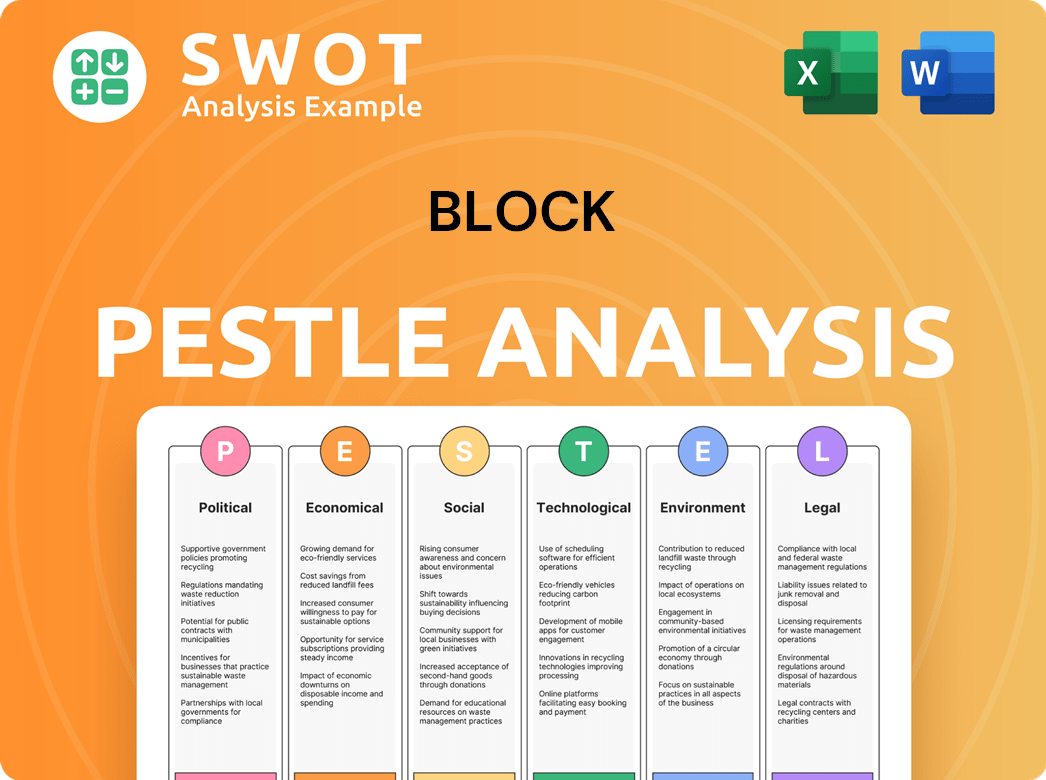
What Is Block’s Growth Forecast?
The financial outlook for Block, formerly known as Square, indicates continued growth, driven by its diversified business model and strategic initiatives. The company's performance in the first quarter of 2024 highlights its strong financial health and ability to expand its market presence. This positive trajectory is supported by robust revenue streams and effective cost management, positioning the company for sustained success in the fintech industry.
Block's financial strategy focuses on expanding its services and innovating within the payment processing sector, which is key to its growth strategy. The company's ability to generate significant cash flow from operations further strengthens its capacity to invest in future growth initiatives. This financial discipline, combined with strategic partnerships, allows Block to navigate the competitive landscape effectively and capitalize on emerging opportunities.
For investors and analysts, understanding Block Company's financial performance is crucial for evaluating its long-term potential. The company's commitment to innovation, expansion into international markets, and strategic acquisitions contribute to its overall growth. A closer look at Block Company's market position and financial health provides valuable insights for making informed investment decisions.
Block reported a gross profit of $2.03 billion for the first quarter of 2024, marking a 16% year-over-year increase. This growth was primarily driven by strong performances in both its Square and Cash App segments. This financial performance demonstrates Block's ability to generate substantial revenue and manage its operations effectively.
Square's gross profit grew by 19% year-over-year, reaching $820 million. This growth reflects the continued adoption of Square's services by small and medium-sized businesses. The segment's success is a key indicator of Block's ability to serve the needs of its merchant customers effectively.
Cash App's gross profit increased by 17% year-over-year, reaching $1.26 billion. This segment's growth highlights the increasing popularity of its peer-to-peer payment services and financial tools. Cash App's strong performance is a significant contributor to Block's overall financial success.
Block's Adjusted EBITDA for Q1 2024 was $650 million, exceeding analyst expectations. This strong performance underscores the company's ability to manage its operational costs efficiently. This financial metric is a key indicator of Block's profitability and financial health.
Block's financial outlook for the second quarter of 2024 and the full year 2024 reflects its confidence in its strategic initiatives and growth prospects. The company's guidance provides a clear picture of its expected financial performance, allowing investors to assess its future potential. This financial outlook is based on the company's current business model and market conditions.
For the second quarter of 2024, Block projects a gross profit between $2.16 billion and $2.18 billion. This forecast indicates continued growth and strong performance across its business segments. This guidance reflects the company's expectations for ongoing expansion and market penetration.
Block anticipates an Adjusted EBITDA between $670 million and $690 million for Q2 2024. This projection demonstrates the company's focus on profitability and efficient cost management. This financial outlook is a key indicator of Block's financial health.
For the full year 2024, Block expects a gross profit of at least $8.70 billion. This forecast underscores the company's confidence in its long-term growth strategy. This guidance reflects Block's expectations for sustained revenue growth.
The company projects an Adjusted EBITDA of at least $2.82 billion for the full year 2024. This guidance demonstrates Block's focus on profitability and efficient operations. This financial outlook is a key indicator of Block's long-term financial health.
Operating expenses increased by 8% year-over-year in Q1 2024. This controlled spending reflects Block's strategic approach to managing costs while investing in growth initiatives. The company's focus on financial discipline supports its long-term sustainability.
Block's cash flow from operations was $537 million in Q1 2024. This robust cash flow provides the company with the financial flexibility to fund future growth initiatives. This strong cash flow position supports Block's strategic investments.
Block's financial performance and future prospects are closely tied to its strategic initiatives and market position. The company's ability to innovate and adapt to the changing fintech landscape will be crucial for its long-term success. Understanding Block's business model and revenue streams is essential for assessing its potential. For more insights, consider reading a Brief History of Block.
Block Business Model Canvas
- Complete 9-Block Business Model Canvas
- Effortlessly Communicate Your Business Strategy
- Investor-Ready BMC Format
- 100% Editable and Customizable
- Clear and Structured Layout
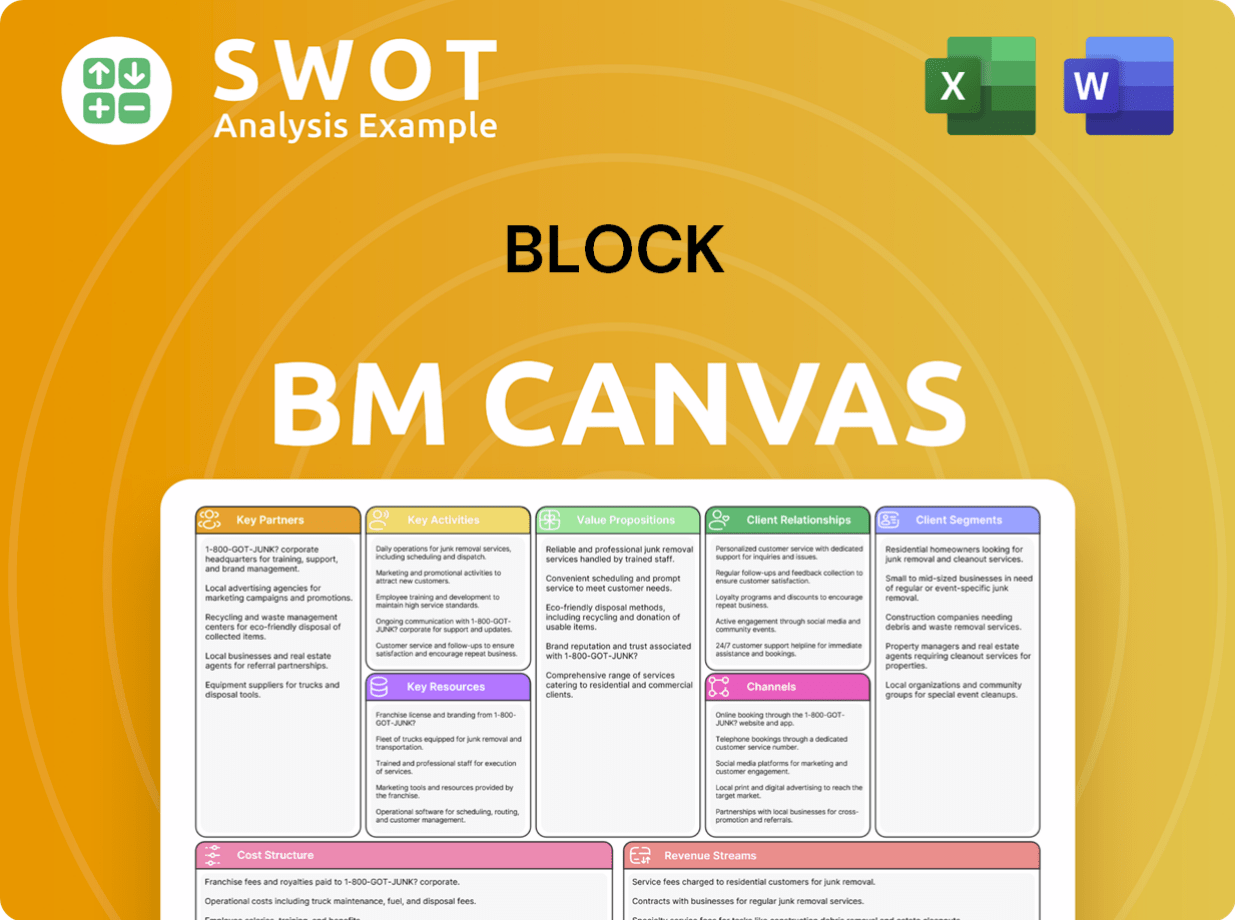
What Risks Could Slow Block’s Growth?
The growth strategy of Block faces several potential risks and obstacles. The company operates in a highly competitive market, contending with both established financial institutions and agile fintech startups. Furthermore, evolving regulations and internal challenges related to rapid expansion pose significant hurdles for Block's future.
Market competition, particularly in payment processing and digital banking, is a constant pressure. Regulatory changes, especially those impacting cryptocurrency activities, could significantly affect Block's operations. Supply chain vulnerabilities and technological disruptions also present operational risks.
Internally, managing rapid growth and maintaining a strong company culture are ongoing challenges. Block's ability to navigate these risks will be critical to its long-term success and achieving its strategic goals. Understanding these factors is crucial for any Block Company Analysis.
The fintech industry is incredibly competitive, with numerous players vying for market share. Established financial institutions and innovative fintech startups alike present significant challenges to Block's growth. This competition impacts Block Company Market and its ability to expand its services.
As a financial technology company, Block is subject to evolving regulations. These regulations, particularly those related to data privacy, consumer protection, AML, and cryptocurrency, can significantly affect its operations. Increased scrutiny on cryptocurrency activities could affect initiatives like TBD and Cash App's Bitcoin services, which is a key aspect of Block Company Strategy.
Supply chain disruptions, especially concerning hardware for Square POS systems, can disrupt operations. These vulnerabilities, as seen during global supply chain issues, can impact Block's ability to meet customer demand. This is a crucial factor when considering Block Company Future.
Emerging innovations or more efficient platforms developed by competitors could erode Block's competitive advantage. The rapid pace of technological advancements requires Block to continuously innovate to stay ahead. This is a key consideration for Block Company Investment.
Managing rapid growth while maintaining a cohesive company culture and attracting top talent presents an ongoing challenge. Scaling operations effectively while preserving the company's values is essential for long-term success. This impacts Revenue Streams & Business Model of Block.
Block addresses these risks through diversification of product offerings, robust risk management frameworks, and continuous monitoring of regulatory landscapes. Proactive compliance and investments in cybersecurity help mitigate external pressures. The company's resilience is evident in its navigation of a dynamic market.
The payment processing market is highly competitive, with Block facing established players and innovative fintech companies. The ability to gain and maintain market share is critical for Block Company Growth. Competition drives the need for continuous innovation and strategic partnerships.
Compliance with evolving regulations, including those related to data privacy and cryptocurrency, can be costly. These costs include legal fees, technology upgrades, and ongoing monitoring. Regulatory changes can also impact Block's ability to expand its services and enter new markets.
Disruptions to the supply chain, particularly for hardware components, can impact Block's operations. These disruptions can lead to delays in product delivery and increased costs. Diversifying suppliers and building inventory can help mitigate these risks.
Attracting and retaining top talent is crucial for Block's success, especially in a competitive market. The company must offer competitive compensation, benefits, and a positive work environment. Managing rapid growth while maintaining a cohesive culture is also essential.
Block Porter's Five Forces Analysis
- Covers All 5 Competitive Forces in Detail
- Structured for Consultants, Students, and Founders
- 100% Editable in Microsoft Word & Excel
- Instant Digital Download – Use Immediately
- Compatible with Mac & PC – Fully Unlocked
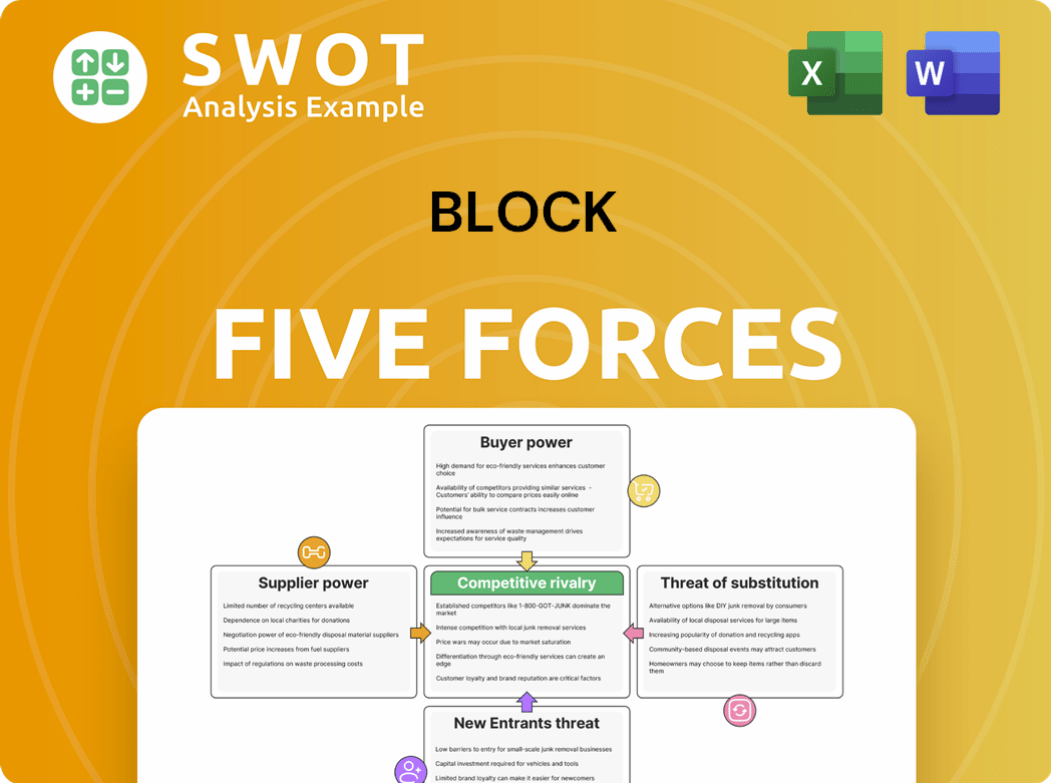
Related Blogs
- What are Mission Vision & Core Values of Block Company?
- What is Competitive Landscape of Block Company?
- How Does Block Company Work?
- What is Sales and Marketing Strategy of Block Company?
- What is Brief History of Block Company?
- Who Owns Block Company?
- What is Customer Demographics and Target Market of Block Company?
Disclaimer
All information, articles, and product details provided on this website are for general informational and educational purposes only. We do not claim any ownership over, nor do we intend to infringe upon, any trademarks, copyrights, logos, brand names, or other intellectual property mentioned or depicted on this site. Such intellectual property remains the property of its respective owners, and any references here are made solely for identification or informational purposes, without implying any affiliation, endorsement, or partnership.
We make no representations or warranties, express or implied, regarding the accuracy, completeness, or suitability of any content or products presented. Nothing on this website should be construed as legal, tax, investment, financial, medical, or other professional advice. In addition, no part of this site—including articles or product references—constitutes a solicitation, recommendation, endorsement, advertisement, or offer to buy or sell any securities, franchises, or other financial instruments, particularly in jurisdictions where such activity would be unlawful.
All content is of a general nature and may not address the specific circumstances of any individual or entity. It is not a substitute for professional advice or services. Any actions you take based on the information provided here are strictly at your own risk. You accept full responsibility for any decisions or outcomes arising from your use of this website and agree to release us from any liability in connection with your use of, or reliance upon, the content or products found herein.